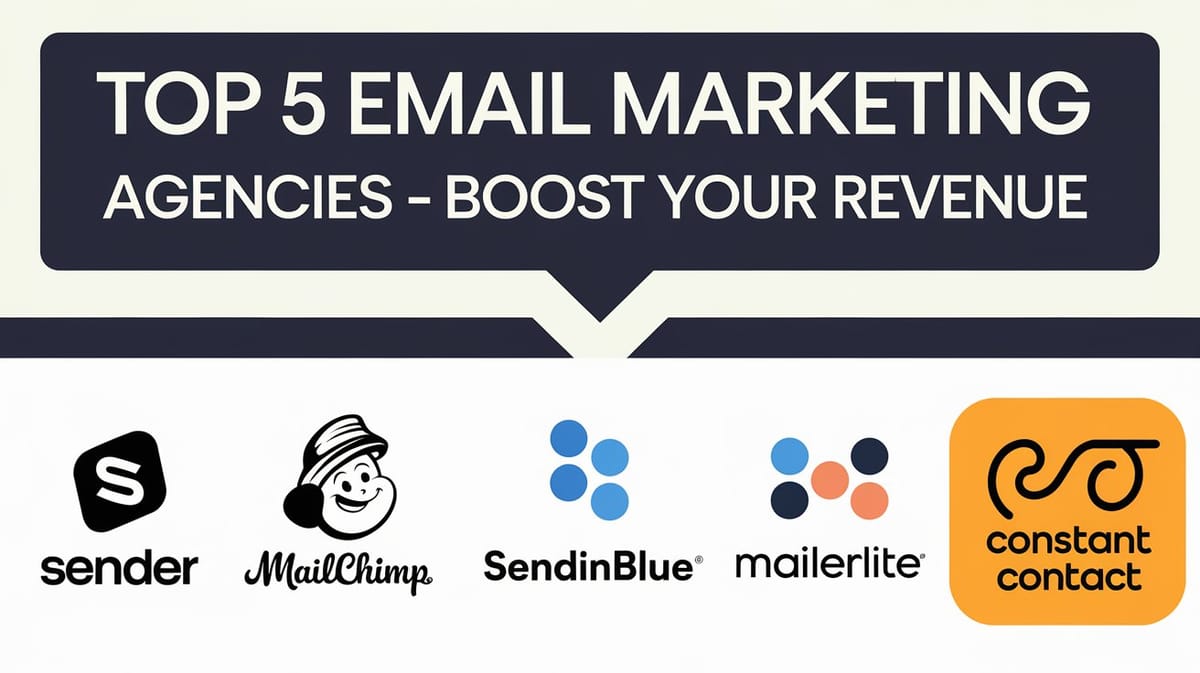Top 5 Email Marketing Agencies - Boost Your Revenue

In the rapidly evolving digital landscape, email marketing remains a cornerstone strategy for businesses aiming to enhance customer engagement and drive revenue growth. As of 2024, email marketing continues to offer an impressive return on investment (ROI), with reports indicating an average ROI of 4,200%, translating to $42 for every dollar spent. This makes it an indispensable tool for businesses across various industries.
The effectiveness of email marketing lies in its ability to deliver personalized, targeted content directly to consumers' inboxes, a space they visit daily. However, achieving optimal results requires more than just sending out periodic newsletters or promotional emails. It demands a well-crafted strategy that incorporates best practices such as segmentation, personalization, and marketing automation.
You can also visit Oncely.com to find more Top Trending AI Tools. Oncely partners with software developers and companies to present exclusive deals on their products. One unique aspect of Oncely is its “Lifetime Access” feature, where customers can purchase a product once and gain ongoing access to it without any recurring fees. Oncely also provides a 60-day money-back guarantee on most purchases, allowing customers to try out the products and services risk-free.
Oncely are hunting for the most fantastic AI & Software lifetime deals like the ones below or their alternatives:

Table of Contents
- Understanding Email Marketing Revenue Potential
- The Role of Email Marketing Agencies in Revenue Enhancement
- Key Strategies Employed by Leading Email Marketing Agencies
- Measuring the Impact of Email Marketing on Revenue
- Challenges and Opportunities in Email Marketing
- Future Trends in Email Marketing
- Implementing Effective Email Marketing Strategies
- Identifying Leading Email Marketing Agencies
- Key Strategies for Revenue Enhancement
- Enhancing Customer Engagement through Content
- Leveraging Data and Analytics
- Compliance and Best Practices
- Optimizing Email Campaigns for Increased Revenue
- Personalization and Segmentation
- Automation and Workflow Optimization
- A/B Testing and Performance Analysis
- Mobile Optimization
- Integration with Other Marketing Channels
- Advanced Analytics and Reporting
- Dynamic Content and Interactive Elements
- Compliance and Deliverability
- Conclusion
Understanding Email Marketing Revenue Potential
The Role of Email Marketing Agencies in Revenue Enhancement
Email marketing agencies play a pivotal role in enhancing business revenue by leveraging targeted communication strategies. These agencies specialize in crafting personalized email campaigns that resonate with specific audience segments, thereby increasing engagement and conversion rates. According to a 2023 report by Statista, the number of email users worldwide is expected to reach 4.6 billion by 2025, highlighting the vast potential audience for email marketing campaigns.
Agencies utilize advanced analytics and customer data to segment audiences effectively, ensuring that the right message reaches the right people at the right time. This targeted approach not only improves open and click-through rates but also enhances customer retention and lifetime value. For instance, a study by Campaign Monitor found that segmented email campaigns can result in a 760% increase in revenue.
Key Strategies Employed by Leading Email Marketing Agencies
-
Personalization and Automation
Personalization is a cornerstone of successful email marketing strategies. Agencies use sophisticated tools to personalize content based on user behavior, preferences, and past interactions. This approach is supported by data from Experian, which indicates that personalized emails deliver six times higher transaction rates.
Automation further enhances personalization by allowing agencies to send timely, relevant messages without manual intervention. Automated workflows can include welcome series, cart abandonment reminders, and post-purchase follow-ups, all of which contribute to increased revenue. According to HubSpot, businesses that use marketing automation to nurture prospects experience a 451% increase in qualified leads.
-
A/B Testing and Optimization
A/B testing is a critical strategy employed by email marketing agencies to optimize campaign performance. By testing different elements such as subject lines, call-to-action buttons, and email layouts, agencies can determine what resonates best with their audience. This data-driven approach leads to continuous improvement and higher conversion rates. Mailchimp reports that A/B testing can improve email marketing ROI by up to 37%.
-
Integration with Other Marketing Channels
Leading agencies understand the importance of integrating email marketing with other digital marketing channels. This integration ensures a cohesive brand message and maximizes reach. For example, combining email marketing with social media campaigns can amplify engagement and drive traffic to landing pages. A study by Omnisend found that marketers using three or more channels in their campaigns earned a 287% higher purchase rate than those using a single channel.
Measuring the Impact of Email Marketing on Revenue
To effectively measure the impact of email marketing on revenue, agencies employ various metrics and KPIs. These include open rates, click-through rates, conversion rates, and return on investment (ROI). According to Litmus, the average ROI for email marketing is $42 for every $1 spent, making it one of the most cost-effective marketing channels.
Advanced analytics tools allow agencies to track customer journeys and attribute revenue to specific email campaigns. This level of insight enables businesses to understand which strategies are most effective and where to allocate resources for maximum impact. Additionally, customer feedback and engagement metrics provide qualitative data that can inform future campaign strategies.
Challenges and Opportunities in Email Marketing
Despite its potential, email marketing faces several challenges, including deliverability issues, spam filters, and changing consumer preferences. Agencies must stay abreast of industry trends and technological advancements to overcome these obstacles. For instance, the rise of AI and machine learning presents opportunities for more sophisticated audience segmentation and predictive analytics, as noted by Forrester.
Moreover, the increasing emphasis on data privacy and regulations such as GDPR and CCPA requires agencies to adopt transparent data practices and obtain explicit consent from users. This shift towards privacy-centric marketing can enhance trust and brand loyalty, ultimately contributing to long-term revenue growth.
Future Trends in Email Marketing
The future of email marketing is likely to be shaped by several emerging trends. Interactive emails, which allow users to engage with content directly within the email, are gaining popularity. These emails can include elements such as surveys, polls, and product carousels, enhancing user engagement and driving conversions. According to Litmus, interactive emails can increase click-to-open rates by 73%.
Additionally, the use of AI and machine learning is expected to grow, enabling more precise targeting and personalization. Predictive analytics can help agencies anticipate customer needs and tailor content accordingly, leading to higher engagement and revenue. As these technologies evolve, email marketing agencies will continue to play a crucial role in helping businesses navigate the digital landscape and maximize their revenue potential.
Implementing Effective Email Marketing Strategies
Identifying Leading Email Marketing Agencies
In the competitive landscape of digital marketing, selecting the right email marketing agency is crucial for businesses aiming to enhance their revenue. Leading agencies such as Mailchimp, Campaign Monitor, and Klaviyo have established themselves as frontrunners by offering comprehensive solutions tailored to diverse business needs. These agencies are recognized for their robust platforms that integrate advanced analytics, automation, and personalization features, which are essential for executing successful email marketing campaigns.
Mailchimp, for instance, is renowned for its user-friendly interface and extensive integration capabilities, making it a preferred choice for small to medium-sized enterprises (Mailchimp). Campaign Monitor offers a strong focus on design and customization, allowing businesses to create visually appealing emails that resonate with their audience (Campaign Monitor). Klaviyo, on the other hand, excels in data-driven marketing, providing businesses with the tools to leverage customer data for personalized communication (Klaviyo).
Key Strategies for Revenue Enhancement
Email marketing agencies employ a variety of strategies to boost revenue for their clients. One of the most effective strategies is segmentation, which involves dividing the email list into smaller, targeted groups based on specific criteria such as demographics, purchase history, or engagement levels. This approach allows businesses to send more relevant and personalized content, leading to higher open and click-through rates. According to a study by HubSpot, segmented email campaigns can result in a 760% increase in revenue.
Another critical strategy is automation, which enables businesses to send timely and relevant emails based on user behavior. Automated emails, such as welcome series, cart abandonment reminders, and post-purchase follow-ups, can significantly enhance customer engagement and drive conversions. Research by Statista indicates that automated emails generate 320% more revenue than non-automated emails.
Personalization is also a key component of successful email marketing strategies. By leveraging customer data, agencies can create highly personalized email content that resonates with individual recipients. This can include personalized product recommendations, dynamic content, and personalized subject lines. A report by Experian found that personalized emails deliver six times higher transaction rates.
Enhancing Customer Engagement through Content
Content plays a pivotal role in the success of email marketing campaigns. Leading agencies focus on creating compelling and engaging content that captures the attention of recipients and encourages them to take action. This includes crafting attention-grabbing subject lines, using high-quality visuals, and providing valuable information that addresses the needs and interests of the audience.
Interactive content, such as polls, quizzes, and videos, can also enhance engagement by encouraging recipients to interact with the email. According to Litmus, emails with interactive content can increase click-to-open rates by 73%. Additionally, storytelling is a powerful tool that agencies use to connect with the audience on an emotional level, fostering brand loyalty and driving conversions.
Leveraging Data and Analytics
Data and analytics are at the core of effective email marketing strategies. Leading agencies utilize advanced analytics tools to track and measure the performance of email campaigns, providing valuable insights into customer behavior and preferences. This data-driven approach allows businesses to optimize their campaigns for better results.
Key metrics that agencies monitor include open rates, click-through rates, conversion rates, and unsubscribe rates. By analyzing these metrics, businesses can identify areas for improvement and make data-informed decisions to enhance their email marketing efforts. A study by Campaign Monitor found that businesses that use data-driven marketing are six times more likely to achieve a competitive advantage in terms of profitability.
Compliance and Best Practices
Compliance with email marketing regulations is essential for maintaining a positive brand reputation and avoiding legal issues. Leading agencies ensure that their clients adhere to regulations such as the General Data Protection Regulation (GDPR) and the CAN-SPAM Act. This includes obtaining explicit consent from recipients, providing clear opt-out options, and ensuring transparency in data collection and usage.
Best practices in email marketing also involve maintaining a clean and updated email list, using double opt-in methods to confirm subscriptions, and regularly testing email campaigns to optimize performance. According to Return Path, maintaining a clean email list can improve deliverability rates by up to 20%.
In summary, implementing effective email marketing strategies involves selecting the right agency, employing key strategies such as segmentation, automation, and personalization, creating engaging content, leveraging data and analytics, and adhering to compliance and best practices. By focusing on these areas, businesses can enhance their email marketing efforts and drive significant revenue growth.
Optimizing Email Campaigns for Increased Revenue
Personalization and Segmentation
Personalization and segmentation are critical strategies in optimizing email campaigns for increased revenue. According to a study by Statista, personalized email campaigns can increase revenue by up to 760%. This is achieved by tailoring content to individual preferences and behaviors, which enhances engagement and conversion rates. Leading email marketing agencies utilize advanced data analytics to segment audiences based on demographics, purchase history, and engagement levels. This segmentation allows for targeted messaging that resonates with specific customer segments, thereby increasing the likelihood of conversion.
Automation and Workflow Optimization
Automation in email marketing is a powerful tool for enhancing efficiency and revenue. By automating repetitive tasks such as welcome emails, cart abandonment reminders, and follow-up sequences, businesses can ensure timely and relevant communication with their audience. According to HubSpot, businesses that use marketing automation to nurture prospects experience a 451% increase in qualified leads. Email marketing agencies implement sophisticated automation workflows that not only save time but also optimize the customer journey, leading to higher conversion rates and increased revenue.
A/B Testing and Performance Analysis
A/B testing is a fundamental practice in optimizing email campaigns. By testing different elements such as subject lines, call-to-action buttons, and email layouts, businesses can identify what resonates best with their audience. According to Campaign Monitor, A/B testing can improve email marketing ROI by up to 37%. Leading agencies conduct rigorous A/B testing to refine email strategies continually. They also employ performance analysis tools to track key metrics such as open rates, click-through rates, and conversion rates, allowing for data-driven decision-making that enhances campaign effectiveness and revenue.
Mobile Optimization
With the increasing use of mobile devices for email access, optimizing email campaigns for mobile is crucial. According to Litmus, 46% of all email opens occur on mobile devices. Email marketing agencies ensure that emails are mobile-friendly by using responsive design techniques, concise content, and clear calls to action. This optimization not only improves user experience but also increases the likelihood of engagement and conversion, thereby boosting revenue.
Integration with Other Marketing Channels
Integrating email marketing with other marketing channels can significantly enhance its effectiveness and revenue potential. According to Omnisend, campaigns that integrate three or more channels earn a 287% higher purchase rate than single-channel campaigns. Email marketing agencies often integrate email campaigns with social media, content marketing, and paid advertising to create a cohesive and comprehensive marketing strategy. This integration ensures consistent messaging across platforms, amplifies reach, and increases the chances of conversion, ultimately leading to higher revenue.
Advanced Analytics and Reporting
Advanced analytics and reporting are essential for optimizing email campaigns. By leveraging data analytics, businesses can gain insights into customer behavior, preferences, and engagement patterns. According to Forrester, companies that adopt data-driven marketing are six times more likely to be profitable year-over-year. Email marketing agencies use advanced analytics tools to track and analyze campaign performance, identify trends, and make informed adjustments to strategies. This data-driven approach enables businesses to optimize their campaigns for maximum impact and revenue generation.
Dynamic Content and Interactive Elements
Incorporating dynamic content and interactive elements in email campaigns can significantly enhance engagement and revenue. Dynamic content allows for real-time personalization, such as product recommendations based on browsing history or location-based offers. According to Experian, emails with dynamic content generate 18 times more revenue than static emails. Interactive elements, such as polls, quizzes, and videos, increase engagement by encouraging recipients to interact with the email content. Leading email marketing agencies leverage these techniques to create engaging and revenue-generating email campaigns.
Compliance and Deliverability
Ensuring compliance with regulations such as GDPR and CAN-SPAM is crucial for maintaining email deliverability and protecting brand reputation. Non-compliance can lead to penalties and damage to customer trust. According to Return Path, maintaining a good sender reputation is essential for achieving high deliverability rates. Email marketing agencies implement best practices for compliance, such as obtaining explicit consent, providing easy opt-out options, and maintaining clean email lists. These practices not only ensure compliance but also enhance deliverability, leading to higher open rates and increased revenue.
Conclusion
By focusing on personalization, automation, A/B testing, mobile optimization, integration with other channels, advanced analytics, dynamic content, and compliance, email marketing agencies can significantly enhance the effectiveness of email campaigns. These strategies not only improve engagement and conversion rates but also drive substantial revenue growth for businesses.





